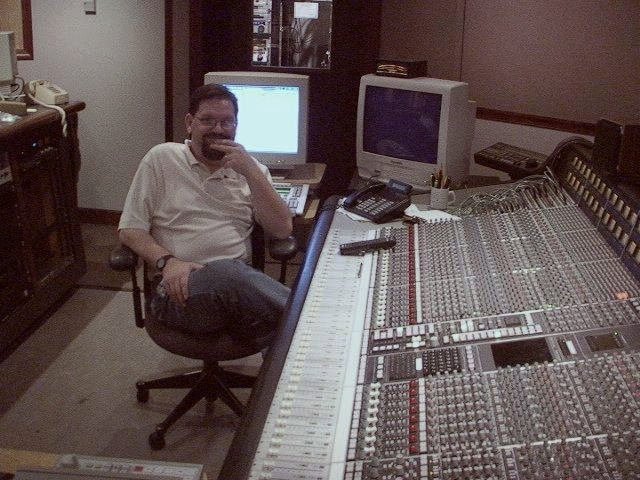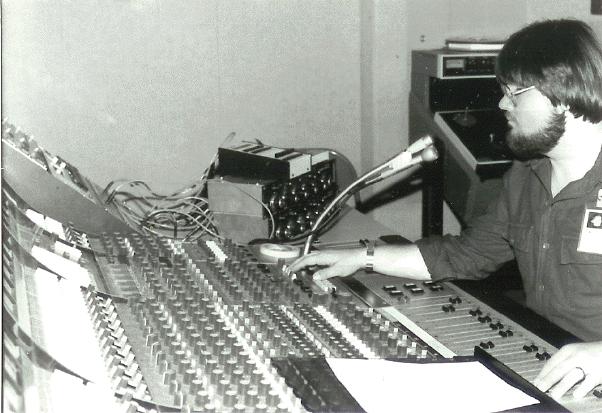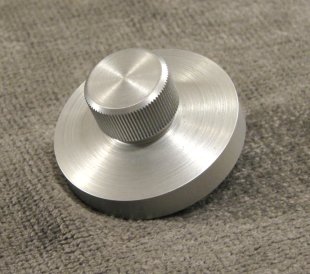
 |
|
#16
|
|||
|
|||
|
Quote:
I kind of think of reverb doing that, not compression. |
|
#17
|
||||
|
||||
|
Quote:
I tend think both can contribute to that . And then also , even as technical much of recording is, in the end much is still personal preference and a number of the descriptive terms are very much subject to personal perspective. Warm - Glue - Sparkle etc.etc. Dealing with just myself as a client and having a pretty good hardware Reverb, and almost always using reverb more as ambience than effect . My SOP is to have all my different instruments sending into a single parallel Aux reverb track into that HW reverb. And so the theory is hopefully all the instruments should sound like they are in the same space. For separation (which I tend to think of in left to right) I use mostly panning and then also possible some EQ For moving things forward or backward in the space (but still in the same overall space =reverb ) is where I use compression and usually only have the lead vocal move a slight bit forward ....
__________________
Enjoy the Journey.... Kev... KevWind at Soundcloud KevWind at YouYube https://www.youtube.com/playlist?lis...EZxkPKyieOTgRD System : Studio system Avid Carbon interface , PT Ultimate 2023.12 -Mid 2020 iMac 27" 3.8GHz 8-core i7 10th Gen ,, Ventura 13.2.1 Mobile MBP M1 Pro , PT Ultimate 2023.12 Sonoma 14.4 Last edited by KevWind; 03-29-2024 at 07:50 AM. |
|
#18
|
||||
|
||||
|
Quote:

__________________
Enjoy the Journey.... Kev... KevWind at Soundcloud KevWind at YouYube https://www.youtube.com/playlist?lis...EZxkPKyieOTgRD System : Studio system Avid Carbon interface , PT Ultimate 2023.12 -Mid 2020 iMac 27" 3.8GHz 8-core i7 10th Gen ,, Ventura 13.2.1 Mobile MBP M1 Pro , PT Ultimate 2023.12 Sonoma 14.4 |
|
#19
|
|||
|
|||
|
OP again here. Lots of interesting comments. What was interesting to me was that even though now, we can VERY SPECIFICALLY alter the sound in many ways, there is not a lot of consensus on how that should go. Maybe technology vs. art ? Maybe my next post will be about the virtues of Vinyl ... Lee

__________________
in alphabetical order, (so none of them gets jealous)  Breedlove, Eastman, Epiphone, Fender, Gibson, Godin, Guild, Gurian, Larrivee, Loar, Martin, Recording King, Taylor, Voyage Air, Webber, Yamaha ... |
|
#20
|
||||
|
||||
|
Yeah, I think this is the dynamic we are dealing with. A favorite example of this sort of situation is The Wallflowers Bringing Down the Horse album from 1996. It was state of the art for the time, recorded at the best studios and mixed by Chris Lord-Algae. It was, however, produced by T Bone Burnett, who has a habit of putting a "stamp" or twist on each of the albums he produces. In this case, you get the album home, put it on a good system, and discover that there is, indeed, a certain signature on all the songs. Everything recorded is just slightly distorted, with a light distortion that doesn't vary by level, it just sits there, as if it was added in mastering. It sounds "grainy." It is a more subtle version of what producer Roy Thomas Baker did. Roy had a favorite recorder he used, a Stephens 32 track with the tracks squeezed onto 2" tape, that allowed him to easily push every track into distortion. He was convinced that rock n roll shouldn't be recorded with pristine recording techniques. You can hear the effect prominently on Queen's A Night at the Opera album if you listen on a good system. It sets my teeth on edge, but he made good money with it.
Bob
__________________
"It is said, 'Go not to the elves for counsel for they will say both no and yes.' " Frodo Baggins to Gildor Inglorion, The Fellowship of the Ring THE MUSICIAN'S ROOM (my website) |
|
#21
|
|||
|
|||
|
Quote:
It's hard to argue against the idea that these digital technologies are technically superior to their analog equivalents, so why are we still so enamored of the old ways? I highly recommend Damon Krukowski's podcast (and book of the same title) "Ways of Hearing," (https://www.radiotopia.fm/showcase/ways-of-hearing) podcast series, which talks about what is different and what we have gained and lost with the move to digital music.
__________________
Patrick 2012 Martin HD-28V 1984 Martin Shenandoah D-2832 2018 Gretsch G5420TG Oscar Schmidt Autoharp, unknown vintage ToneDexter Bugera V22 Infinium |
|
#22
|
|||
|
|||
|
Because the "old ways", with all their technical limitations, are what we got used to. I roll my eyes when people claim that vinyl is "closer to the source" than digital. I know Bob Womack has posted the thousand-and-one ways that the signal is mangled to get it into grooves on a piece of vinyl--way more EQ'd, compressed and otherwise processed than any digital recording. But that sound, with all its flaws, is what people grew up hearing and are familiar and comfortable with. Same thing with that low-end bump and high-end loss with tape; it's what we are used to hearing, so much so that we even emulate it with digital processing. It really has nothing to do with fidelity to the source signal whatsoever.
|
|
#23
|
|||
|
|||
|
Quote:
The interesting thing to me is that current vinyl records are recorded using modern digital methods, so the only noise and distortion induced is that of vinyl record (and the RIAA equalization curve) itself. Is this just fashion, nostalgia, or something else?
__________________
Patrick 2012 Martin HD-28V 1984 Martin Shenandoah D-2832 2018 Gretsch G5420TG Oscar Schmidt Autoharp, unknown vintage ToneDexter Bugera V22 Infinium |
|
#24
|
|||
|
|||
|
Quote:
Or, does it suffer from the High end loss as well? Or does it keep the integrity of the highs? Unfortunately I am still intrigued by the concept of tape sound. It seemed like it was easier to get a basic sound with tape. And as others have mentioned probably because tape naturally rounded and compressed a bit. So mistakes, harshness from dynamics were slightly tamed and less noticeable. But then again...I certainly don't want to loose the Highs & their harmonics that this new age of DAW recording allows. UAD is offering Any two plug ins for $99 until the 1st. Trying not to spend money! But don't want to pass on something I might like as well. There is always this internal fight within me. When I used tape (Teac 3340 4 track)), I thought it was easy to get a good sound...But I always wanted more openness. It was smooth, but lacked the detail I wanted. In the digital world I get more openness & detail, but I yearn for a little bit of roundness. |
|
#25
|
||||
|
||||
|
I used it on the last album I mixed. The ATR-102 was a fantastic transport with pretty good high-end response. I worked on them for years. I used the ATR-102 on the master bus, at the request of my co-producer. Frankly, he was a youngster and was always looking for some magic pixie dust for the mixes we did. The plug has an animated front panel of the 102 and when you engage it, the reels move. You can choose between 15ips tape speed, more low end, more headroom, but more noise, and 30ips, less bass, less headroom, glassier highs, and less noise. Made me feel right at home. I didn't feel a lot high end loss at 15ips, not like the times we used Abbey Road to master our albums, Their analog path rounded things right out. It mostly imposed the gentle EQ characteristics, a tiny bit of noise, and some gentle, smooth distortion for sheen. For glue, I use about 3-4db of the Waves Solid State Logic 4000 Master Bus Compressor. I am familiar with the analog version of this one as well because I mixed on SSL consoles for years, right after I mixed on Neve consoles.
 That's 2003 with me at the SSL 4048 at work. I weigh about sixty pounds less now.  Me at a Neve 8058 in 1982. That's an ATR-102 behind me. We had thirteen of the 102s throughout the facility. Boy do I have stories. They were extremely complicated but the finest transport for editing and at speed accuracy that was ever developed. We hired an engineer basically to keep them going. When it came time to upgrade the facility and we had all these surplus 102s, I found out that ATR Magnetics, the same outfit that bought out the Ampex manufacturing plant and now makes tape, bought up these machines, rebuilt and upgraded them, and sold them for a fortune. I suggested a sale and they bought all of ours. Somewhere out there they are all still making music in ones and twos and being treasured by their owners. Ten years later I called up Michale Spitz (RIP) at ATR and asked him if he remembered the deal and he did. I asked if I could buy a cueing knob from him for old times sake. Instead, he sent me a wonderful, machined example from the first generation of 102s as a gift. It is in my guitar room these days.  Bob
__________________
"It is said, 'Go not to the elves for counsel for they will say both no and yes.' " Frodo Baggins to Gildor Inglorion, The Fellowship of the Ring THE MUSICIAN'S ROOM (my website) |
|
#26
|
|||
|
|||
|
Quote:
I still have analog tape recorders in my studio but tape is expensive, tape recorders are a maintenance hassle, and digital recording is so much more cost-effective and fast, as well. So I can have the advantages of digital recording on my computer and the sound of analog tape by using this tape recorder plug-in. The difference isn't huge, but I think it's a subtle improvement. I don't want my overall sound to sound too much like an old tape recorder. Consequently, when I use the tape plug-in, I apply it very lightly. Too much does make a muddy sound, but a little, for me, anyway, is a positive. - Glenn
__________________
My You Tube Channel Last edited by Glennwillow; 03-30-2024 at 08:45 AM. |
|
#27
|
|||
|
|||
|
Quote:
I move things front to back with volume, eq and and early reflections, side to side with panning, and use ambience/reverb to create a common space. I want as much separation as possible between the instruments, rebelling against anything like a "wall of sound". Maybe I'm missing something but "gluing" anything together seems counter to what I'm after. Because I'm not a pro at this and hear pro mixes that make my envious, I'm sure I'm missing something but don't know what it is. |
|
#28
|
||||
|
||||
|
Quote:
I like to think I use compression to enhance presence, separation, and definition and as I said I am guessing in my non-pro opinion, that judicious use of compression is transparent and does not noticeably reduce fidelity Now I certainly do not claim to have the critical listening skills of seasoned pro's. But I think the notion of compression somehow being a degrading factor of sonics , came out of misuse in the unbridled loudness wars and could be more myth than reality. Agin and perhaps only to my non pro ears ---well configured compression can give a more pleasing result to move a particular element forward in the sound stage than just EQ, Reverb etc. Given EQ which is simply a level boost or cut in a given frequency range. I may just have play around with demo video of using comp, verb and EQ
__________________
Enjoy the Journey.... Kev... KevWind at Soundcloud KevWind at YouYube https://www.youtube.com/playlist?lis...EZxkPKyieOTgRD System : Studio system Avid Carbon interface , PT Ultimate 2023.12 -Mid 2020 iMac 27" 3.8GHz 8-core i7 10th Gen ,, Ventura 13.2.1 Mobile MBP M1 Pro , PT Ultimate 2023.12 Sonoma 14.4 Last edited by KevWind; 04-01-2024 at 06:29 AM. |
|
#29
|
|||
|
|||
|
Agreed. It seems to me that the over-use of any effect will degrade a recording, with compression in the loudness wars being one of the more egregious examples.
__________________
Patrick 2012 Martin HD-28V 1984 Martin Shenandoah D-2832 2018 Gretsch G5420TG Oscar Schmidt Autoharp, unknown vintage ToneDexter Bugera V22 Infinium |
|
#30
|
|||
|
|||
|
Quote:
I do use a limiter on the stereo buss and don't have a problem with that. |